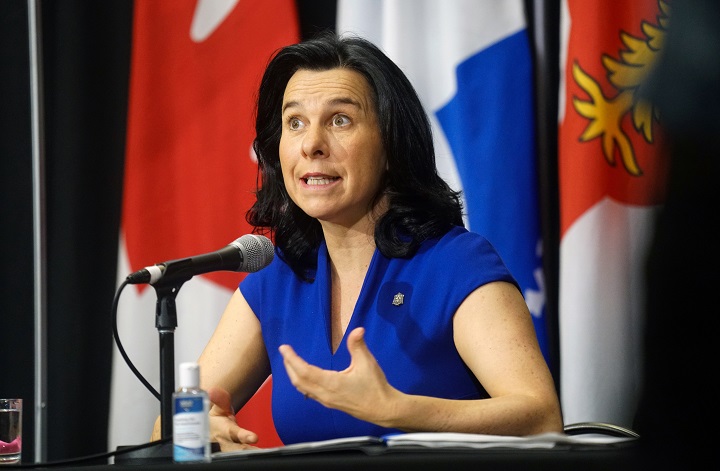The City of Montreal is giving its seal of approval to the federal government’s 2021-2022 budget tabled Monday afternoon by Finance Minister Chrystia Freeland.

In a news release, Montreal Mayor Valérie Plante said Freeland’s budget will help support the city’s “green and inclusive” recovery plans, with major investments in public transit, housing, economic development, as well as tourism and culture.
A spokeperson for the mayor pointed to $250-million investment over a three-year period in Montreal’s aerospace industry, a cornerstone of the city’s economy which has been hard hit by the pandemic.
The Chamber of Commerce of Metropolitan Montreal (CCMM) agreed the budget will give the aerospace ecosystem a much-needed boost, that will benefit the overall economy.
“Investment in innovation in the aerospace industry, with the plane of the future … that has the most potential for all our economy, good jobs, a strong ecosystem and eventually lots of export,” said Michel Leblanc, president and CEO of CCMM. “So this is very, very key in that budget and it’s key for us.”
The city also welcomed the $443 million set aside for Montreal’s booming artificial intelligence sector.
And while several provisions were made to support small and medium businesses, which make up 80 per cent of the city’s economy, Plante said she would have liked to see more measures tailored specifically to the realities facing city centres as they attempt to recover from the health crisis.
That being said, Plante acknowledged that the $1 billion earmarked for the tourism industry, including hospitality and festivals, will help revive those sectors and by the same token the downtown core.

Get breaking National news
“These sectors are part of Montreal’s DNA and will be intimately linked to its relaunch, which is why we are delighted with the support the government is giving them,” Plante said.
Leblanc, however, was hoping for more measures that would carry businesses through to the end of the pandemic.
Support programs, such as the Canada Emergency Rent Subsidy and the Canada Emergency Wage Subsidy, will only be extended until September.
“What we’re saying is that some sectors might need some additional assistance over the next months, perhaps until December, Leblanc said.
Money for social and affordable housing
For the mayor, housing is central to the idea of a green and inclusive recovery, as the city faces a housing crisis made worse by the pandemic.
Plante said the federal government has set aside significant sums for the creation of new affordable housing units.
“Housing needs are great in Montreal and the funds provided by the Government of Canada will allow us to improve access to social and affordable housing for the population of Montreal,” she said.
In the fall, Ottawa announced $1 billion for social housing initiatives, $58 million of which went to Montreal. As a result of that funding, around 240 community housing units will be built this year, according to the city.
On Monday, Freeland set aside another $1.5 billion for housing initiatives.
“We do not yet know how much will go to Montreal, but one thing is certain, we already have social and affordable housing projects on the table that could benefit from them,” Plante said.
Ottawa also announced control measures to address the real estate bubble, that the city said will benefit first-time buyers and families looking for affordable properties.
Advocates for social and affordable housing, however, feel the federal budget doesn’t go far enough.
The Front d’action populaire en réaménagement urbain (FRAPRU) believes housing investments should be more aggressive.
“The budgetary measures won’t help attain the ambitious objectives set in the National Housing Strategy,” FRAPRU said, adding that the majority of investments for the Rapid Housing Initiative are destined in most part to private housing developers and encourage the creation of housing with rents that are too high for the average renter.
Money for public transit
While the city is pleased with the $15 billion over eight years going towards public transit initiatives across the country, there was disappointment over the lack of relief measures for public transit operators in big cities.
Many have seen a sharp decline in ridership as a result of COVID-19, accompanied by a drop in revenues.
“It’s a heavy burden imposed on municipalities that don’t have options to diversify revenue,” the mayor’s office said.
The budget has yet to be voted on in the House of Commons.
Leblanc said he hopes opposition parties won’t play politics and will adopt it.
— With files from Global News’ Gloria Henriquez











Comments